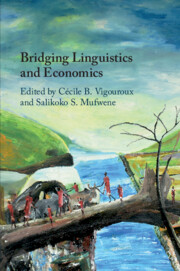Book contents
- Bridging Linguistics and Economics
- Bridging Linguistics and Economics
- Copyright page
- Contents
- Figures
- Tables
- Contributors
- Preface
- 1 Do Linguists Need Economics and Economists Linguistics?
- 2 Economists Do Need Linguists
- 3 The Invisibility of Linguistic Diversity Online
- 4 Evaluating Language Policy and Planning
- 5 The Economics of Language Diversity and Language Resilience in the Balkans
- 6 Determinants of Bilingualism among Children
- 7 Economy and Language in Africa
- 8 The Unequal Exchange of Texts in the World Language System
- 9 Language Economics and Language Rights
- Author Index
- Subject Index
- References
7 - Economy and Language in Africa
Published online by Cambridge University Press: 02 March 2020
- Bridging Linguistics and Economics
- Bridging Linguistics and Economics
- Copyright page
- Contents
- Figures
- Tables
- Contributors
- Preface
- 1 Do Linguists Need Economics and Economists Linguistics?
- 2 Economists Do Need Linguists
- 3 The Invisibility of Linguistic Diversity Online
- 4 Evaluating Language Policy and Planning
- 5 The Economics of Language Diversity and Language Resilience in the Balkans
- 6 Determinants of Bilingualism among Children
- 7 Economy and Language in Africa
- 8 The Unequal Exchange of Texts in the World Language System
- 9 Language Economics and Language Rights
- Author Index
- Subject Index
- References
Summary
One of the root causes of the poor economic performance and fragility in Africa is the marginalization of the majority of the people, due to the absence of efficient and effective language policy and planning. Language policy and planning in Africa will need to focus on the management of multilingualism as a fundamental tool to achieve sustainable and long-term endogenous development. This chapter explores the nexus between language and the economy, and presents an economic situation that is directly impacted by the current language policies on the continent.
- Type
- Chapter
- Information
- Bridging Linguistics and Economics , pp. 182 - 202Publisher: Cambridge University PressPrint publication year: 2020
References
- 5
- Cited by



